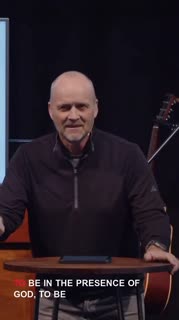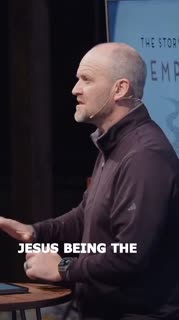Reorienting Worship: Rejecting Idols, Embracing Christ
Devotional
Sermon Summary
Bible Study Guide
Sermon Clips
"To praise something is to declare its glory. And when we come into this room and we're surrounded by this beautiful music, people with gifts and abilities to draw us by that beauty into the presence of God and declare what we know to be true and what we believe with all of our hearts to be true, we are praising God. But our praise and our worship is not bound to this place on this time, at this time. That it transcends into all areas of our life." [00:37:48] (29 seconds)
"To be in the presence of God, to be exposed to His grace and truth, to see Him in His beauty, to believe these things to be true, is to say, I can't remain the same. It's confrontational. It's an intimidating thing, if you really think about it, to know and believe and to be a follower of the living God." [00:39:10] (24 seconds)
"God comes before them and says, Here I am, the living God, the one who has acted on your behalf, the one who is fighting for you, the one who set you free from slavery. Do not have any other gods beside me. Those gods, He says, are not living, are not powerful, and certainly, therefore, are not fighting for you, but I am." [00:39:46] (23 seconds)
"They knew they needed an intermediary. They knew that they were unworthy. See, to be exposed to the glory of God, the holiness of God that we have sung about, is to recognize our unworthiness and our unholiness. It's to be put in front of ourselves in a profound way, and we know what Adam and Eve did when they sinned. They hid from God." [00:40:57] (21 seconds)
"The other thing we need to notice is we become like what we worship. See, Moses and God are talking up on the mountain. Forty days they're communing together. And God comes and says, they have just committed the one thing I asked them not to do. They have done that very thing." [00:46:47] (18 seconds)
"Jesus being the cleft in the rock, being the hand of God to expose us to the glory without destroying us. Jesus being the one who, when we give our hearts to him, he sends his spirit into our life and begins a work of transformation, making us more like himself." [00:51:08] (16 seconds)
"Our idols of today, I fear, are ideologies. We're not necessarily worshiping golden calves, but we've said, here's what I know to be concrete, immediate, and functional. If I hold on to a belief, an ideology, that I can frame my identity around, that, that will give my life, meaning, it may also lead you towards idolatry." [00:55:18] (27 seconds)
"When we take the blessings of God and center our lives on that, we might be worshiping an idol. When we ask something to deliver us, to give us identity, purpose, and belonging that is apart from God, we might be following an idol. What are the good things that we are susceptible to making the ultimate things?" [00:58:38] (24 seconds)
"When we repent, when we ask those questions with bravery and with courage in the presence of Christ, He might show us something that we need to remove or reorient. And we need to look at those good things as good things, as favors, given by God in order to steward them, not make them into ultimate things, but rather be the ones who manage them." [01:05:51] (27 seconds)
Ask a question about this sermon
"To be in the presence of God, to be exposed to His grace and truth, to see Him in His beauty, to believe these things to be true, is to say, I can't remain the same. It's confrontational. It's an intimidating thing, if you really think about it, to know and believe and to be a follower of the living God." [00:39:10] (24 seconds)
"God comes before them and says, Here I am, the living God, the one who has acted on your behalf, the one who is fighting for you, the one who set you free from slavery. Do not have any other gods beside me. Those gods, He says, are not living, are not powerful, and certainly, therefore, are not fighting for you, but I am." [00:39:46] (23 seconds)
"They knew they needed an intermediary. They knew that they were unworthy. See, to be exposed to the glory of God, the holiness of God that we have sung about, is to recognize our unworthiness and our unholiness. It's to be put in front of ourselves in a profound way, and we know what Adam and Eve did when they sinned. They hid from God." [00:40:57] (21 seconds)
"The other thing we need to notice is we become like what we worship. See, Moses and God are talking up on the mountain. Forty days they're communing together. And God comes and says, they have just committed the one thing I asked them not to do. They have done that very thing." [00:46:47] (18 seconds)
"Jesus being the cleft in the rock, being the hand of God to expose us to the glory without destroying us. Jesus being the one who, when we give our hearts to him, he sends his spirit into our life and begins a work of transformation, making us more like himself." [00:51:08] (16 seconds)
"Our idols of today, I fear, are ideologies. We're not necessarily worshiping golden calves, but we've said, here's what I know to be concrete, immediate, and functional. If I hold on to a belief, an ideology, that I can frame my identity around, that, that will give my life, meaning, it may also lead you towards idolatry." [00:55:18] (27 seconds)
"When we take the blessings of God and center our lives on that, we might be worshiping an idol. When we ask something to deliver us, to give us identity, purpose, and belonging that is apart from God, we might be following an idol. What are the good things that we are susceptible to making the ultimate things?" [00:58:38] (24 seconds)
"When we repent, when we ask those questions with bravery and with courage in the presence of Christ, He might show us something that we need to remove or reorient. And we need to look at those good things as good things, as favors, given by God in order to steward them, not make them into ultimate things, but rather be the ones who manage them." [01:05:51] (27 seconds)









